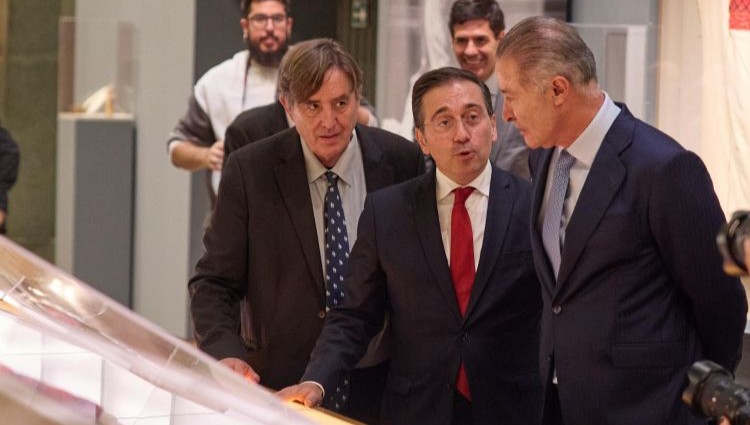Eduardo González
Foreign Minister José Manuel Albares reaffirmed on Friday the relationship between Spain and Mexico, which “is among the strongest that any two countries in the world can have,” and recalled the “pain and injustice suffered by indigenous peoples,” which “is also part of our shared history and we cannot deny or forget it.”
Albares made these remarks during the inauguration of the exhibition “Half the World: Women in Indigenous Mexico” at the Cervantes Institute in Madrid, organized by the Ministry through the Spanish Agency for International Development Cooperation (AECID), together with the Mexican Ministry of Culture, through the National Institute of Anthropology and History of Mexico (INAH).
The exhibition brings together 435 pieces that will be on display for the next few months at four major venues in Spain – the National Archaeological Museum, the Casa de México Foundation in Spain, the Cervantes Institute, and the Thyssen-Bornemisza National Museum – and has been organized in collaboration with the Spanish Ministry of Culture, the Cervantes Institute, and the Ibero-American General Secretariat (SEGIB). Some of these works will be exhibited for the first time outside of Mexico.
“With this exhibition, we draw even closer to our Mexican sister nation, which all Spaniards hold dear in their hearts,” Albares stated to the attendees, among whom were the Mexican Ambassador to Spain, Quirino Ordaz; the State Secretary for International Cooperation, Eva Granados; and the Director of the Cervantes Institute, Luis García Montero.
“We are all aware that we are living through times of global uncertainty, that institutions and practices that until now seemed to be the stable pillars of the international order are openly questioned, if not threatened, and precisely because we are living through a time of change and uncertainty, the strong and firm ties between sister nations that know and feel close to each other, like the Mexican and Spanish people, become so important,” he continued.
“The relations between Spain and Mexico are among the strongest that any two countries in the world can have, and they are relations that are evident every day,” he added. These relations, he affirmed, are reflected both in the economic and commercial sphere, because “Spain is the second largest investor in Mexico, after the United States, and Mexican investment in Spain, which grows every year, exceeds 30 billion euros,” and in the personal and human sphere, thanks to “the 180,000 Spaniards currently residing in Mexico and the 40,000 Mexicans who live in perfect harmony in our country.”
Albares also affirmed that “Spain will never forget, and we will never cease to be grateful for, the welcome extended by the Mexican people and the government of Lázaro Cárdenas to the Spanish exiles who found on that other shore of the ocean that unites us the freedom denied them here by the dictatorship.”
“Culture, language, art, science, economic, social, personal, and familial ties—all of these great and positive aspects exist and have existed in our relations, in our history, a very human history, and like all human history, it has its light and shadows,” he continued. “There has also been pain, pain and injustice toward the Indigenous peoples to whom this exhibition is dedicated,” he stated. “There was injustice, and it is right to acknowledge it today, and it is right to lament it, because that is also part of our shared history, and we cannot deny or forget it,” he added.
Last Monday, Mexican President Claudia Sheinbaum asserted that her country has not severed “any ties” with Spain, but insisted that her government is still “awaiting a response” to the letter from her predecessor, Andrés Manuel López Obrador, to King Felipe VI, urging him to apologize for the Spanish conquest.
Claudia Sheinbaum excluded King Felipe VI from the guest list for her inauguration (October 1, 2024) for not having responded to a letter from Andrés Manuel López Obrador urging him to apologize for the Spanish conquest.
The Spanish government called this decision “unacceptable” and announced that it would not participate in the inauguration “at any level.” Amid the controversy, Claudia Sheinbaum stated in a press release that the King had been excluded from the guest list for not having responded to Andrés Manuel López Obrador’s letter.
